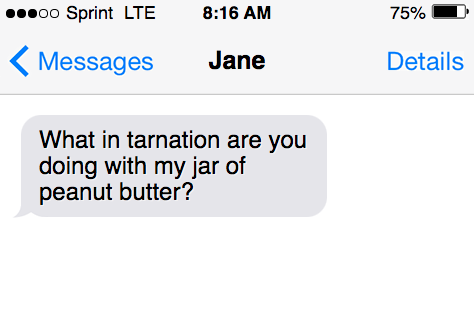What does “what in tarnation” mean? Is it a phrase and idiom that is commonly used in American English? Or is it simply an idiom that appears in American cartoons and the American West?
Learn more in this short idiom guide…
What Does “What In Tarnation” Mean?
“What in tarnation” is used as an exclamation phrase of anger or a sudden surprise. It is also associated or connected to another curse word, “tarnal“, akin to eternal. The words “what in tarnation” fall under the category of an American idiom. In this particular case, the keyword comprises damn or, more accurately, the derivative damnation, which leads to a euphemism known as damnation. It is often used to express damnation (the direct meaning of tarnation is damnation) as an interjection.
Also used as a noun or an adverb, the words, the three words, and what in tarnation are opined to be a mild oath. It comes from back in the time of the old west of America. This was a period when curse words were used quite freely, as a way of life. Associated with Yosemite Sam, a widely popular Warner Brothers cartoon character based in the American old west, the phrase has just stuck with several Americans.

Origins of the Idiom “What In Tarnation”
So how did the letter d get replaced with the letter t?
Way back in 18th-century colonial America, tarnal was used often as an acceptable alternative to the word eternal. For a period, this could mean an expression of profanity derived from the complete expression of eternal God. To make it sound more short and clean, it got replaced with eternal meaning God. And over time, it got clipped to ternal and eventually became tarnal, which is a dialect shortcut for eternal.
It would seem strange in today’s world that the word eternal was a curse word back in the 17th and 18th centuries. However, back then, the words eternal would imply invoking religions feelings or sentiments. Calling someone or labeling something eternal disparagingly meant or related to a mild oath.
As per Geoffrey Hughes, the word tarnation first showed up in the Encyclopedia of Swearing in the year 1784, shortly after the word darn. However, some claim that the first instance of the use of the word tarnation was in a play by Royall Tyler called Contrast in 1790. Jonathan, the character, used it thrice. Having said so, it is difficult to find its precise origins.
Tarnation is a good example of euphemisms from the 18th century because it combines two euphemisms into a single word. The word tarnation comes from damnation, which essentially is a euphemistic variation of damnation. During the 18th century, this was inappropriate for a polite conversation.
Examples of “What In Tarnation” Used In Sentences
Some examples of using it correctly
- What in tarnation are you doing with my jar of peanut butter?
- What in tarnation is going on at the back over there?
- Mike, what in tarnation are you going on about?
- Where is all that loud noise coming from? What in tarnation is happening over there in the room?
- Sure as tarnation, I ain’t getting married
- I ran down to know what in tarnation am I supposed to do
Examples of incorrect use
You can use it in several ways, but sometimes its use is incorrect. Some possible ways in which it is incorrectly used include:
- Hi, what in tarnation is this plan here, let us get going!
- I have no idea what in tarnation you are planning to get done.
Is “Tarnation” a Southern Word?
Tarnation means damning or damned, It expresses anger or annoyance. The popularity of using the term what in tarnation traced back to New England is common. However, the term is no longer widely used in New England. The term continues to be used widely in southern North America, and it has become synonymous with a southern word.
Who First Said The Word “Tarnation?”
Tarnation is an American word, and it originated way back in the 18th century. No established source has documented who first used the word.
The site www.appalachianhistory.net claims that the word first appeared in the Encyclopedia of Swearing in 1784. Another site, www.todayifoundout.com, states that the words first found their way in the play by Royall Tyler in 1790.
As per the site, www.merriam-webster.com, it was first used in the year 1790.
It is known that the word originated in North America and was used all across America, especially in southern parts. It continues to be a popular phrase in southern parts of America even today.
Furthermore, It is challenging to verify the claims. It is widely known that it is an American word used in the 18th century. The word was a replacement for eternal or a reference to religious feelings as an attempt to make it sound more polite during conversations. In the 18th century word tarnal was more acceptable than eternal in conversations.
Inside this article
Fact checked:
Content is rigorously reviewed by a team of qualified and experienced fact checkers. Fact checkers review articles for factual accuracy, relevance, and timeliness. Learn more.
Core lessons
Glossary
- Abstract Noun
- Accusative Case
- Anecdote
- Antonym
- Active Sentence
- Adverb
- Adjective
- Allegory
- Alliteration
- Adjective Clause
- Adjective Phrase
- Ampersand
- Anastrophe
- Adverbial Clause
- Appositive Phrase
- Clause
- Compound Adjective
- Complex Sentence
- Compound Words
- Compound Predicate
- Common Noun
- Comparative Adjective
- Comparative and Superlative
- Compound Noun
- Compound Subject
- Compound Sentence
- Copular Verb
- Collective Noun
- Colloquialism
- Conciseness
- Consonance
- Conditional
- Concrete Noun
- Conjunction
- Conjugation
- Conditional Sentence
- Comma Splice
- Correlative Conjunction
- Coordinating Conjunction
- Coordinate Adjective
- Cumulative Adjective
- Dative Case
- Determiner
- Declarative Sentence
- Declarative Statement
- Direct Object Pronoun
- Direct Object
- Diction
- Diphthong
- Dangling Modifier
- Demonstrative Pronoun
- Demonstrative Adjective
- Direct Characterization
- Definite Article
- Doublespeak
- False Dilemma Fallacy
- Future Perfect Progressive
- Future Simple
- Future Perfect Continuous
- Future Perfect
- First Conditional
- Irregular Adjective
- Irregular Verb
- Imperative Sentence
- Indefinite Article
- Intransitive Verb
- Introductory Phrase
- Indefinite Pronoun
- Indirect Characterization
- Interrogative Sentence
- Intensive Pronoun
- Inanimate Object
- Indefinite Tense
- Infinitive Phrase
- Interjection
- Intensifier
- Infinitive
- Indicative Mood
- Participle
- Parallelism
- Prepositional Phrase
- Past Simple Tense
- Past Continuous Tense
- Past Perfect Tense
- Past Progressive Tense
- Present Simple Tense
- Present Perfect Tense
- Personal Pronoun
- Personification
- Persuasive Writing
- Parallel Structure
- Phrasal Verb
- Predicate Adjective
- Predicate Nominative
- Phonetic Language
- Plural Noun
- Punctuation
- Punctuation Marks
- Preposition
- Preposition of Place
- Parts of Speech
- Possessive Adjective
- Possessive Determiner
- Possessive Case
- Possessive Noun
- Proper Adjective
- Proper Noun
- Present Participle
- Prefix
- Predicate



